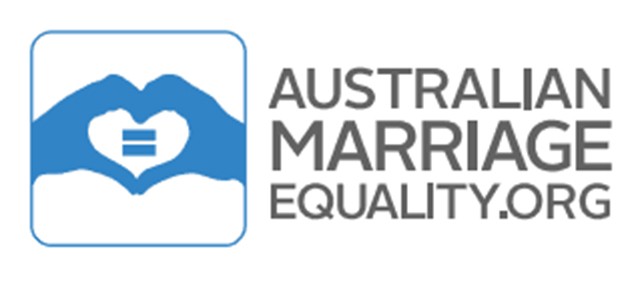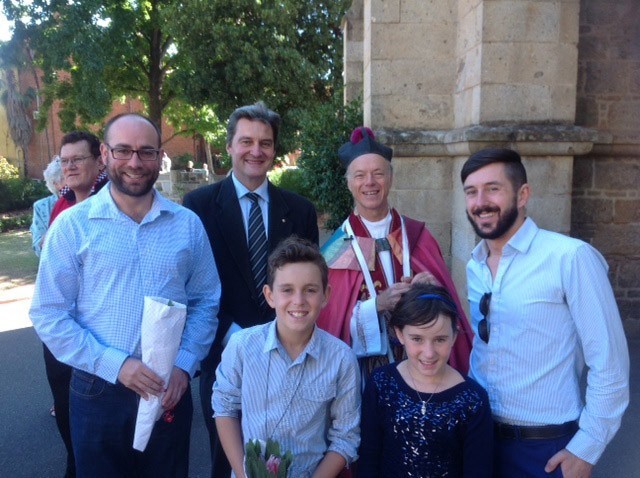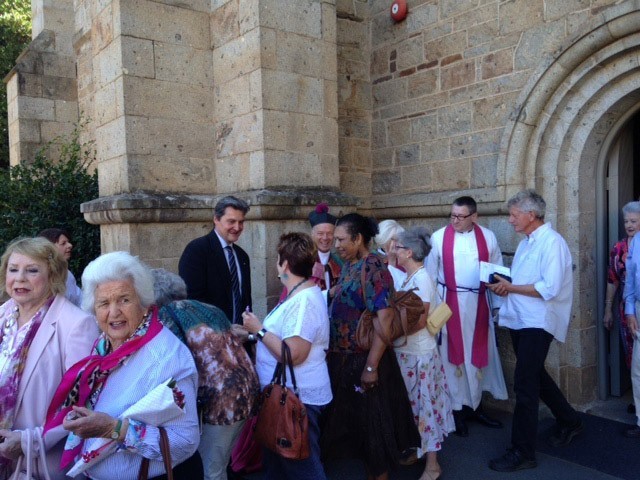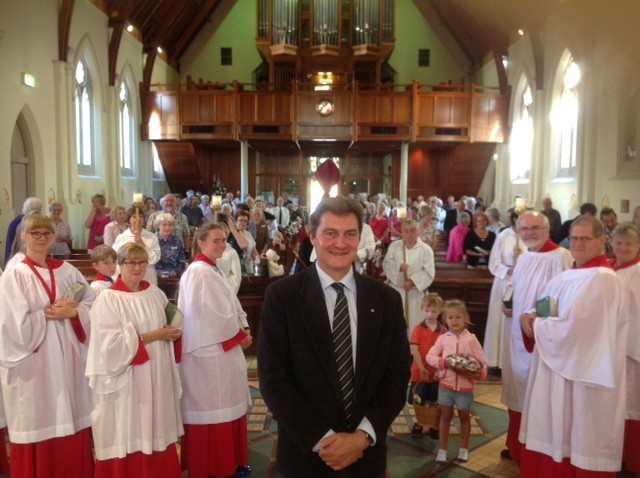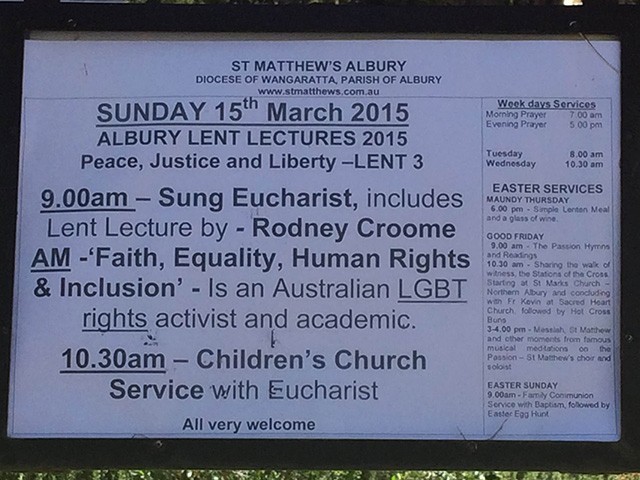In a sign of growing support for marriage equality among people of faith, marriage advocate and Tasmanian of the Year, Rodney Croome, was invited to address the congregation of St Matthews Anglican Church in the regional NSW city of Albury on Sunday.
As part of a series of lent lectures given by prominent Australians including historian, Geoffrey Blainey, and former High Court judge, Michael Kirby, Mr Croome spoke from the pulpit about the reasons growing numbers of Australian Christians support marriage equality.
After the service, Mr Croome, who is national director of Australian Marriage Equality, said,
“It was a great privilege to be welcome by the St Matthews community at such an important time in the Christian calendar.”
“What I had to say was very well received by parishioners, with many thanking me for advocating on behalf of same-sex partners and their families, and for deepening their understanding about such an important issue.”
“The congregation at St Matthews represents the majority of Australian Christians who consistently show up in national polling as supporters of marriage equality.”
About 250 people attended the service at which Mr Croome spoke with some families making the three hour trip from Melbourne to attend.
Mr Croome also spoke more broadly about gay, lesbian, bisexual and transgender issues, working for justice and his upbringing as an Anglican.
According to polling conducted last year by the Liberal Party’s go-to research company, Crosby/Textor, 63% of Australian Christians support marriage equality.
For a copy of the address scroll down or click here.
Photos of Rodney Croome greeting parishioners are attached. The minister pictured is Archdeacon Fr Peter MacLoed-Miller, who issued the invitation to Mr Croome.
For more information contact Rodney Croome on 0409 010 668.
Author: Rodney Croome
Publication: AME Media Release
Date: 20 March 2015
St Matthews Anglican Church, Albury
Lent Lecture, March 2015
Rodney Croome AM
National Director of Australian Marriage Equality
Tasmanian of the Year 2015
Where is God?
Thank you for your welcome today, and for your welcome several months ago when I first came to St Matthews. It meant more to me than you may realise.
I grew up in the Anglican Church. As a child I attended a small, wooden, country church in Sheffield, Tasmania, called St Barnabas. I loved going to that church. I loved the crisp clothes we wore, the elevated words we sang and the beautiful flowers whose scent filled the air.
Later I was confirmed in Devonport and attended services there. I was a serious young man looking to understand more about the faith of my ancestors, to be uplifted spiritually, and to find a solution to the conflict between who I was and who I was expected to be. I found none of these.
That’s why it was so important to me to be welcomed here last year, and again today, not despite who I am and what I do but because of it. Amidst your goodwill, ageless ritual, beautiful music and welcome I have found not just a church but a community, not just a revelation but a destination.
Lately I’ve been thinking a lot about C.S. Lewis. He is best known for his children’s books about the fantasy kingdom of Narnia. But he wrote much else besides. In my estimation he was one of the greatest Christian writers of the twentieth century and the greatest Anglican thinker.
What’s brought Lewis into focus for me is that I am rereading one his greatest books, Till we have faces. It retells the ancient myth of Cupid and Psyche. The original tale was about Psyche, a mortal woman, who searched the world for her lover, the god Cupid, son of Venus. Lewis develops this into a beautiful story told by Psyche’s sister who searches for the divine despite doubt, scepticism, loss and pointless suffering. Through that character Lewis asks “where is God?”
I think today’s reading from Luke (Luke 1: 46-55) hints at where God can be found. But to explain what I mean I have to take you across hundreds of kilometres and back many years to Salamanca Market in Hobart in 1988.
I had only been out as a gay man for a few months when I was arrested at Salamanca Market for the “crime” of staffing a market stall calling for homosexuality to be decriminalised. The stall consisted of information about the law and a petition. But the Hobart City Council said we had no place in a “family market”, closed the stall down, brought in the police and arrested anyone associated with our little gay law reform group. I was in gaol for being a gay rights advocate before I’d even danced with another man.
It is because of the invitation to be here today that those events are fresh in my mind. When Fr Peter asked me to speak today he suggested I could talk about the 800th anniversary of the Magna Carta, the thirteenth century guarantee that the powers-to-be must respect of individual rights, including the right to petition parliament. That took me back to the moment during the Salamanca arrests when a policeman ripped a gay law reform petition from my hands and tore it into tiny pieces up close to my face. I was so shocked all I could say was “what about the Magna Carta?”. The policeman looked at me like I was an idiot.
What I think what I meant by that question was “is this how the world really is, arbitrary power and nasty prejudice trampling fairness and dignity unrestrained?” At that moment I faced a choice between continuing to defend my rights and retreating back into the safe middle class life I’d lived until then. I looked around me at all the other brave souls, young and old, gay and straight, who were being carted off, and I decided I could not betray them. I faced the policemen, said I had every right to petition the government and was thrown in the back a police van with the others.
We don’t make decisions like that once. We make them many times.
I recall about a decade ago meeting a friend of mine who is transgender outside the anti-discrimination commission where she had been representing herself in a case against a political party that had attacked transgender folk. Until then my involvement with transgender issues had been minimal. But as we walked through the city I noticed for the first time that many people looked with uncamouflaged disdain at my friend. I wanted to shout at them to stop staring. I wanted to walk away from my friend and the discomfort I felt. But instead I made a choice to work more actively with her and others to end this kind of prejudice. I resolved to always walk by her side.
I have faced the same choice about being an advocate for marriage equality. In 2012 marriage equality was defeated in the federal and Tasmanian parliaments in the space of just a few days. It seemed like those who govern us were utterly indifferent to the majority of people in favour. Part of me just wanted to step away from the campaign and from my frustration and disappointment. But then a conversation with an older relative reminded me what it was all about. “When are you going to marry Raf (my partner) and make him part of the family?”, she asked me. I joked that it was up to Julia and Tony, not me. But beneath the banter was an important truth: marriage is about family, it creates kinship, it binds generations together. The exclusion of gay and lesbian people from marriage is a potent symbol of how we have too-often been ostracised from our families, and even portrayed as anti-family. In turn, allowing us to marry is about our full inclusion in family and community life. It’s about belonging.
I think this dimension of marriage equality is why many Australian Christians support the reform; 63% according to the most recent poll. Many Christians understand the benefits of fostering enduring relationships in a world where everything is considered disposable. Many Christians understand the importance of stable and secure family life, especially for children. Commitment and stability are just important to same-sex couples and their children as they are to opposite-sex couples and their’s. Many Christians of good and open heart get this. There are few things worse than being forced from your family and home. Family, inclusion and belonging are deeply important to me and to so many of the LGBTI people I know. I couldn’t walk away from that so in 2012 I picked myself up and kept going.
Even in the week just ended I was faced with a choice between the hard road and the easy one. The Launceston City Council voted against a marriage equality motion, in stark contrast to your far more progressive council here in Albury.
When I was asked my response I could have expressed disappointment and left it safely at that like I had many times before. But instead I talked about the direct link between community leaders opposing marriage equality and gay youth suicide. I knew this would anger some people and prompt them to question my credibility. I was right. At least one Christian group condemned me for intolerance, vilification and lacking perspective.
But the statistics are clear: in the US, when public officials oppose marriage equality, anxiety, depression and suicide among LGBTI people increases. The same was recorded in Australia when the government here banned same-sex marriage in 2004.
To illustrate the human reality behind these statistics I’ll quote from Brisbane psychologist, Paul Martin:
“A mother came in with her seventeen year old son who she found just in time, as he had made an attempt on his life. He was an intelligent, caring much-loved son, brother and was well regarded at school. I asked him why. He said that when he was at school being a fag was the worst thing to be called, that his Dad had talked negatively about ‘poofters’. When he realized he was gay he struggled with depression due to fear of rejection and a sense that he was worthless and his future was without hope. He started watching ‘It Gets Better’ videos on YouTube and began to feel that he may in fact be able to live a good life. But then, just before he was about to come out to his parents, he saw the Prime Minister on TV saying that marriage is between a man and a woman and she would not be supporting marriage equality, without giving any real reasons. At that moment he realised that everything he’d ever been taught about what it means to be gay was in fact true, that he wouldn’t be able to live a good life with a long term partner and happy future. This for him was the tipping point where he chose to end his life.”
That young men has thousands of counterparts across Australia, including some in Launceston. It would have been a betrayal of these young people had I not said what I did.
In today’s reading we are urged to challenge those who exercise power without compassion. We are told to lift up the humble and fill the hungry with good things.
This can be so hard to do. It makes us uncomfortable. It can put us in harm’s way. It can seem futile and be very exhausting. But still we are called to do it and still many of us here respond to this calling again and again, day after day.
So I return to the question C.S. Lewis asked, where is God?
If there is a God and if He is ever with us, it is in those rare and inexplicable moments when we decide to put all doubt, fear and self-interest aside and stand firm in the face of injustice, when we walk with others who are despised, when we bring others in from the cold, when we speak for the voiceless even if it means others will try to silence us too.
I can image few places a truly benevolent and righteous God would rather be.
Thank you

